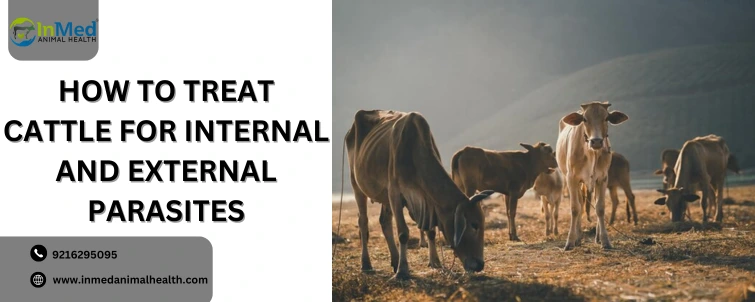





Internal and external parasites can be a major challenge for even the most well-run cattle houses. These parasites can cause serious problems that end in lowered productivity, increased costs of production, decreased profits and, ultimately, lower income. Here we will cover everything you need to know about how to treat cattle for internal and external parasites using fenbendazole (Fenmed).
Want Veterinary PCD Pharma Company?
Internal parasites are those that live and reproduce within the body of their host. They can cause serious health issues in their hosts and affect their performance as well as the efficiency with which they operate.
External parasites are those that live on or in an external surface of the host animal such as hair coat, wool or skin. However, these parasites enter through openings like teat or abrasion on the host’s body.
So treating your cattle for internal and external parasites is vital to maintain good herd health and profitability.
Fenbendazole is a medication used to treat livestock like cattle for internal and external parasites. The drug is usually administered at a dosage of 50 mg/kg of body weight. The drug is administered orally to treat cattle for a variety of internal and external parasites including:
Internal parasites – Ascarids – Nematodes – Hookworms – Trichinellosis – Ring Worms – Mites – Nematodes – Ascarids – Whipworms – Tapeworms – Scabies – Aeromonas – E. Coli – Fungal infections – Haemorrhagic Bacteria – Brucellosis – Anaplasmosis – Clostridial Infections
External parasites – Fleas – Ticks – Mites – Biting Flies – Scabies – Fungal infections – Haemorrhagic Bacteria – Brucellosis
Internal parasites are those that live and reproduce within the body of their host. Internal parasites can cause serious health issues in their hosts and affect their performance as well as the efficiency with which they operate. Parasites can be divided into two categories:
Endoparasites – Endoparasites live within the body of the host and feed off of it. For Example, roundworms, heartworms, tapeworms and bots.
Exoparasites – Exoparasites are parasitic outside the body of the host, for example, lice, scabies and flies.
External parasites
Biting Flies
These flies are blood-sucking parasites that feed off of the blood of cattle. They cause irregular eating and weight loss.
Treatment – There are no medications available to treat cattle for biting flies.
Prevention – Mating flies can be controlled by cleaning with insecticidal soap and frequent washing of the cattle.
Scabies
These parasites cause intense itching in the cattle. They can also cause severe scratching and result in hair loss.
Prevention – Scabies can be prevented by frequent washing of the cattle with a strong antimicrobial solution.
Fleas are blood-sucking parasites that cause intense itching in the cattle. They can also cause severe scratching.
Fleas can be controlled by using a flea collar or topical flea products.
Fenbendazole is most often used to treat internal parasites in cattle or sheep. Internal parasites can be a serious health issue in cattle if they aren’t treated. Internal parasites are responsible for causing anaemia or a reduced red blood cell count in the animal. This degrades the animal’s immune system, making it more susceptible to other diseases.
Internal parasites can also cause conjunctivitis (pimples around the eyes) and pneumonia in cattle. Parasites in cattles include tapeworms, bots, roundworms and threadworms. Internal parasites in goats include bots, roundworms, threadworms and pinworms.
Benefits of Using Fenbendazole for Treatment
– Easy to administer.
– Only needs to be given once per month.
– Can be given orally with no need to treat the cattle.
– Fast acting.
– Most effective when used during the first two weeks of treatment.
Cons of Using Fenbendazole for Treatment
– Can only be used once a month.
– Can only be given orally.
– Side effects – Nausea, vomiting, diarrhoea, increased salivation, increased straining at feed, increased urination, headache.

How Often Should You Administer the Drug?
The treatment time for fenbendazole varies depending on the type of internal and external parasites found on your cattle. For example, treatment for internal parasites will vary depending on the number and type of parasites found in the host. And for external parasites, only the infected areas (e.g., fleas on the hair coat) need treating.
Internal parasites – Treat the host for 2-3 weeks. For example, treat cattle with hookworms, bots or roundworms that cause anaemia.
External parasites – Treat only the area where the parasites are present such as fleas or ticks. For example, treat only the hair coat for fleas.
Internal and external parasites are a major challenge for any cattle operation. These parasites can cause severe health issues, stress and loss of production. Internal and external parasites in cattle are also common causes of death among livestock. They can cause infection, stress, irritation and lameness. They also affect the ability to digest feed, which results in poor weight gain and lower production rates. Thus internal and external parasites in cattle can be treated with the use of fenbendazole (Fenmed Bolus).